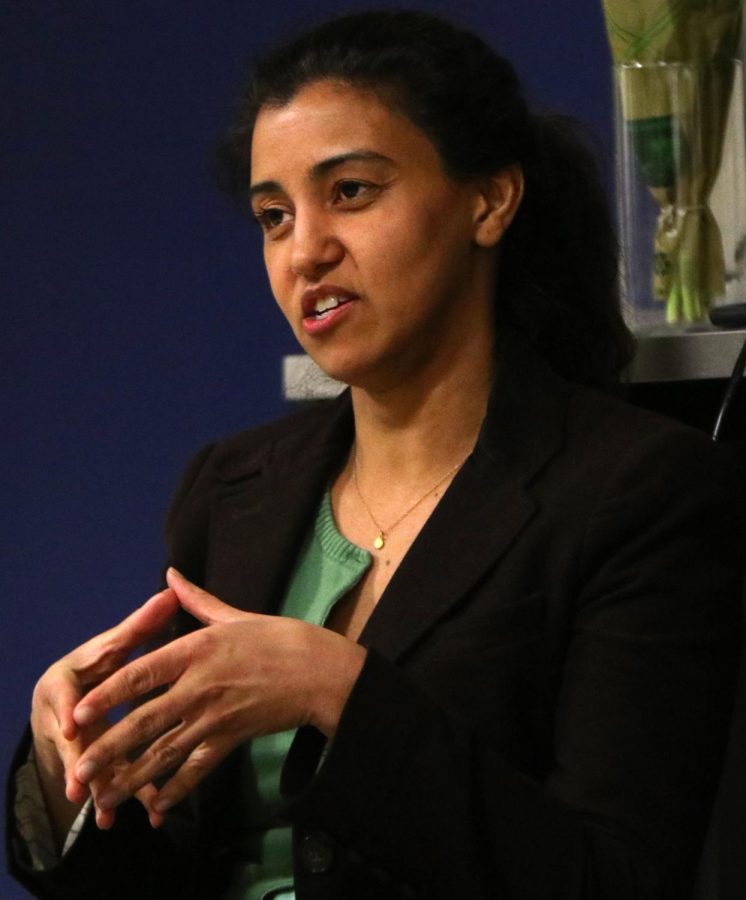Students and faculty discuss travel ban, safe spaces and sanctuary campus
Immigration lawyer Madhu Sharma speaks at a Safe Spaces event in Kent Hall on Tuesday, Feb. 28, 2017. “It’s kind of amazing that I have been doing this for 18 years and now suddenly everybody cares about what we do and has an opinion about it and is protesting and is joining us in our fight,” Sharma said.
February 28, 2017
In light of the recent developments and policy changes enacted by President Donald Trump’s administration, members of the Kent State community came together Tuesday night to discuss immigration issues in the United States.
The event — ”Safe Spaces: Immigration in Trump’s America” — took place in Kent Hall.
The Student Power Coalition and Progressive Faculty Network hosted the event, with immigration lawyer Madhu Sharma as the primary speaker.
The event began with an introduction from Rachel Mason, president of the Spanish and Latino Student Association (S.A.L.S.A.) and member of the Student Power Coalition (SPC). Mason has been active in efforts to make Kent State a sanctuary campus.
“This event is a brainchild of (SPC) — specifically the sanctuary campus initiative section — and the safe spaces faculty,” Mason said. “We feel that it’s necessary to have a dialogue about this topic on our campus, and this is a way to continue education and conversation among students, faculty and staff.”
Following her statement, Joshua Stacher, associate professor of political science, took the floor and introduced Sharma.
Sharma was born in India and came to the United States at a young age. She has been working with immigrants since the ’80s and practiced law in California for 18 years. She is currently practicing in Ohio at the International Institute of Akron, an organization that aids in the resettlement of refugees and immigrants.
Sharma discussed practical points in regards to declaring Kent State a sanctuary campus.
“This is not the time to react quickly,” she said. “We have to have a plan of action. It is the time to start planning, educating and trying to get the information we need to get and share it with each other.”
Walter Gershon, associate professor in the Teaching, Learning and Curriculum Studies department at Kent State, cited instances of other campuses protecting their students from the U.S. Immigration and Customs Enforcement (ICE) and deportation. While sanctuary status would not allow Kent State to completely protect undocumented immigrant students, Gershon said it would help.
“One of the things it does do is provide a series of slowing mechanisms so that human beings in certain places can be not only represented by the institutions in which they’re in, but also have a tiny bit of breathing room,” he said.
Aside from the subject of sanctuary campuses, personal stories were shared by those in attendance, particularly experiences of living as an immigrant in the current political climate.
Maria Zaldivar, associate professor in the Modern and Classical Languages Studies department at Kent State, identifies as Latino. She discussed how members of her family — specifically her son — have been unfairly treated by law enforcement due to their ethnicity.
“The first thing the policeman asked was ‘What are you doing in this neighborhood?’” said Zaldivar, referring to when her husband was pulled over for a minor traffic violation. “He was required to go to court. He did hire an attorney, and the attorney could not understand (why he had to).”
Abdussamad Feyzullayev, a sophomore business management major born and raised in Cleveland, has been the victim of racial and ethnic profiling due to his Uzbek ethnicity.
“Two months ago, coming into the country, I got detained for four hours and asked what (my) ties to ISIS (were),” Feyzullayev said. “Dude, I’m from Cleveland. The biggest tie is we probably both eat falafel and hummus!”
Sharma emphasized that, above all, safety for her clients — the immigrants of the U.S. — is what is most important.
“We are, as a nation, fighting an ideological battle,” Sharma said.
Alec Slovenec is the university diversity reporter, contact him at [email protected].

























